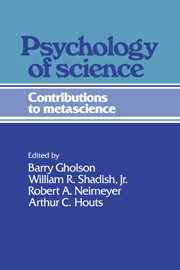Book contents
- Frontmatter
- Contents
- Preface
- Contributors
- 1 The psychology of science: An introduction
- Part I Historical issues in the psychology of science
- Part II The case for a psychology of science
- 4 The reflexivity problem in the psychology of science
- 5 Uneasy chapters in the relationship between psychology and epistemology
- 6 Participatory epistemology and psychology of science
- Part III Creativity and the psychology of science
- Part IV Cognition in the psychology of science
- Part V Social factors in the psychology of science
- Part VI Epilogue and Prologue
- Author index
- Subject index
6 - Participatory epistemology and psychology of science
Published online by Cambridge University Press: 05 June 2012
- Frontmatter
- Contents
- Preface
- Contributors
- 1 The psychology of science: An introduction
- Part I Historical issues in the psychology of science
- Part II The case for a psychology of science
- 4 The reflexivity problem in the psychology of science
- 5 Uneasy chapters in the relationship between psychology and epistemology
- 6 Participatory epistemology and psychology of science
- Part III Creativity and the psychology of science
- Part IV Cognition in the psychology of science
- Part V Social factors in the psychology of science
- Part VI Epilogue and Prologue
- Author index
- Subject index
Summary
Let me begin by affirming the timeliness and relevance of this volume and the issues that it addresses. In my opinion, psychology of science represents one of the most urgent and critical priorities in the continuing development of the sciences. It is impossible to separate human knowledge from human knowing processes and the human knower. This, I believe, is a foundational assumption for psychology of science. It has not gone unchallenged, of course, and writers like Popper have tried long and hard to segregate psychology and epistemology. For the most part, their efforts have been misdirected and unsuccessful. I say “misdirected” because their arguments have usually challenged certain forms of “psychologizing” rather than psychology per se, and – although it may sound overly optimistic – I believe there are approaches to psychology and the cognitive sciences that offer considerable promise in our attempts to understand scientific inquiry.
Efforts to segregate psychology from epistemology have been generally unsuccessful, at least if one's analysis reflects the widespread and increasing interest in the social and psychological processes that permeate our conduct and conceptualization of science (Faust, 1982, 1984; Knorr-Cetina, 1981; Mahoney, 1976, 1979, 1985a; Mitroff, 1974; Weimer, 1979). This volume is but one such reflection, and I hope that it portends a strong and viable trend toward interdisciplinary exchange in epistemology.
Plan of the chapter
In this chapter, I shall not summarize or review my earlier or ongoing work on psychological processes in scientific inquiry.
- Type
- Chapter
- Information
- Psychology of ScienceContributions to Metascience, pp. 138 - 164Publisher: Cambridge University PressPrint publication year: 1989
- 3
- Cited by



